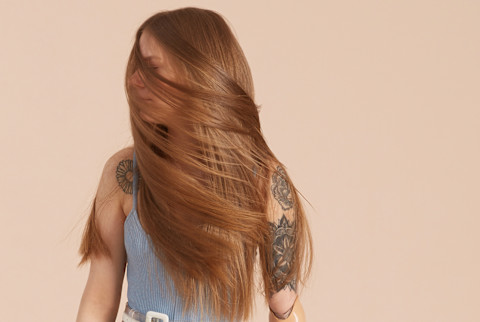Tune In: How To Care For Your Hair & Scalp From A Trichologist

I'm going to give you a peek behind the content production curtain: When we write about anything related to hair growth or loss, that story gets a lot of eye traffic—by which I mean, lots of you read it. As an editor, that signals to me that it's of urgent interest for lots of folks in the mbg community. (It makes sense as to why hair loss is trending upward right now: COVID-related hair loss was a real issue, as is stress-related loss.)
Often, I take that valuable intel and use it as topic inspiration for my podcast Clean Beauty School. Such is the case for today's episode, with hairstylist and trichologist Helen Reavey, founder of hair and scalp care brand Act+Acre. She's a longtime source for me and my fellow beauty editors, so having her on the pod felt like a long time coming.
Throughout the episode, we dive into hair loss, regrowth, and how to actually care for your scalp on a daily basis. "When it comes to scalp care—like skin care—it's all about getting the body into homeostasis," she tells me. "It's about less is more, laying solid foundations, and getting back to the roots—no pun intended."
Here, a few hair growth mistakes she sees all the time.
The mistake: Not personalizing your routine to your scalp type.
"My priority is keeping my scalp in the best possible condition because ultimately that's going to affect how my hair looks in two to three years," Reavey says. "Because once it grows out, there's honestly not much we can do about it at that point."
And the first step in this process is figuring out your scalp type. Yes, your scalp has a type—much like your face does. Luckily it's pretty straightforward how to figure out yours: "Usually it just follows the face: If you have dry skin, you'll likely have a dry scalp—oily skin, oily scalp," she says. If you want help, here's a quiz to identify your skin type.
However, she goes on to explain that there are external factors that will influence the end result, including what type of water you have (hard or soft) and what sort of products you use (i.e., silicone-heavy products or not). As an insight: Soft water and silicone use usually make the scalp feel greasier as they make you more prone to buildup.
The mistake: Improper cleansing.
Lots of us aren't washing our hair properly, and one way to find out is to identify where you get oily first. If the nape of the neck or the crown are the first to show signs of grease, that may be a signal that you need to switch up how you're shampooing.
"Most people start with the shampoo on the top of their head and the midband on the sides, but you're missing a whole chunk of scalp when you do that," she says. Instead, part your hair down the middle all the way, and move the hair past the shoulders on both sides. (Almost like you're planning to put your hair in pigtails.) Then start cleaning the nape, going up to the crown. Once you've cleaned that, then you can go into the top and the sides. And "always double cleanse if you're not shampooing your hair daily," she says.
A quick note: If you're using a sulfate-free shampoo, it won't lather as readily. You need to apply some to the palms of your hand, add a splash or so of water, and work it up in your hands before taking it to the hair and scalp.
The mistake: Not keeping the skin hydrated.
All skin types could benefit from a conditioning scalp treatment—oily, dry, and sensitive included. Reavey recommends scalp and hair oiling, which is a long-standing hair practice in many cultures. On some corners of the internet it has been rebranded as "hair slugging," but it's the same thing.
"I think you're hearing a lot about this right now because so many people are talking about skin slugging," she notes. "And the truth is similar rules apply to your scalp: You can put an oil treatment on the scalp and hair and leave it overnight. You want products that nourish the skin but also stimulate blood flow to the hair follicle so you're ensuring the hair is in its healthiest state." Act+Acre offers a few options (including their Scalp Detox and Stem Cell Scalp Serum), but oils with rosemary oil can also be beneficial.
